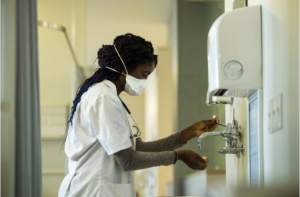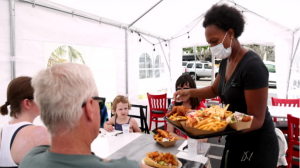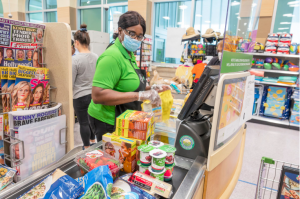 Systemic racism and poverty permeate everything. Black women face not only racial discrimination, which has affected their socioeconomic status and consequently their health, but also sex discrimination. When comparing full-time employees, for every dollar a white man earns, Black women make just 62 cents. It took 50 years, from 1967 to 2018, just for the wage gap to close by 19 cents.
Systemic racism and poverty permeate everything. Black women face not only racial discrimination, which has affected their socioeconomic status and consequently their health, but also sex discrimination. When comparing full-time employees, for every dollar a white man earns, Black women make just 62 cents. It took 50 years, from 1967 to 2018, just for the wage gap to close by 19 cents.
Many Black women work frontline jobs, which provide essential public services during COVID-19. Black women make up only 6.3 percent of the country’s overall workforce, but they make up 11 percent of the front-line workforce. Thirty-seven percent of Black women work frontline jobs, and many employees in these fields are underpaid and are usually not offered paid sick leave.
Black women are overrepresented in frontline industries like food and dining services, commercial retail, and hospitality. Due to the pandemic-related restrictions, many of these businesses were forced to close, and as a result, many Black women lost their jobs.
It is critical to note that in these same jobs, Black women who are still employed are making less money than white men. For example, Black women make up 11.2 percent of full-time hairdressers, hairstylists, and cosmetologists, yet they are typically paid only 63 cents for every dollar white men working in these jobs are typically paid. Therefore, not only have they been shorted once, but now they feel the economic effect more impactfully.
These lost earnings exacerbate the effects COVID-19 has on Black women and their families, who depend on their income. Ultimately, it puts an immense amount of pressure on Black women to risk their own health and the health of others because they need to work in order to provide for their families. Additionally, not only have the COVID-19 layoffs impacted Black women’s health, but it has hindered their financial stability because many of them lost their employer-sponsored health insurance along with their jobs.
 We as a society can improve this inequality in various ways. First, there needs to be more consistency in enforcing the anti-discrimination laws that are already in place. Second, we need to hold employers accountable when hiring and promoting employees by demanding that they publish the company’s statistics regarding its employees’ demographics with an emphasis on which position they fill. Third, there must be a government-backed guideline to ensure a safe working environment and recourse for employees when these guidelines are not being followed. Fourth, all workers, but particularly Black female frontline workers, need to have access to paid sick leave so they are not forced to go to work and risk contracting or spreading the virus. Finally, Americans need to VOTE. We need to vote for government officials who will help raise the national minimum wage, which is currently at $7.25 an hour, so that Black women can be on a more equal footing.
We as a society can improve this inequality in various ways. First, there needs to be more consistency in enforcing the anti-discrimination laws that are already in place. Second, we need to hold employers accountable when hiring and promoting employees by demanding that they publish the company’s statistics regarding its employees’ demographics with an emphasis on which position they fill. Third, there must be a government-backed guideline to ensure a safe working environment and recourse for employees when these guidelines are not being followed. Fourth, all workers, but particularly Black female frontline workers, need to have access to paid sick leave so they are not forced to go to work and risk contracting or spreading the virus. Finally, Americans need to VOTE. We need to vote for government officials who will help raise the national minimum wage, which is currently at $7.25 an hour, so that Black women can be on a more equal footing.
“When we don’t take care of the least [privileged] of us—when we don’t make sure that everyone has equitable care, protection and opportunities—it hurts everyone.”
– Professor Michele Rogers, Kellogg Northwestern.



 Systemic racism and poverty permeate everything. Black women face not only racial discrimination, which has affected their socioeconomic status and consequently their health, but also sex discrimination. When comparing full-time employees, for every dollar a white man earns, Black women make
Systemic racism and poverty permeate everything. Black women face not only racial discrimination, which has affected their socioeconomic status and consequently their health, but also sex discrimination. When comparing full-time employees, for every dollar a white man earns, Black women make 
 We as a society can improve this inequality in various ways. First, there needs to be more consistency in enforcing the anti-discrimination laws that are already in place. Second, we need to hold employers accountable when hiring and promoting employees by demanding that they publish the company’s statistics regarding its employees’ demographics with an emphasis on which position they fill. Third, there must be a government-backed guideline to ensure a safe working environment and recourse for employees when these guidelines are not being followed. Fourth, all workers, but particularly Black female frontline workers, need to have access to paid sick leave so they are not forced to go to work and risk contracting or spreading the virus. Finally, Americans need to
We as a society can improve this inequality in various ways. First, there needs to be more consistency in enforcing the anti-discrimination laws that are already in place. Second, we need to hold employers accountable when hiring and promoting employees by demanding that they publish the company’s statistics regarding its employees’ demographics with an emphasis on which position they fill. Third, there must be a government-backed guideline to ensure a safe working environment and recourse for employees when these guidelines are not being followed. Fourth, all workers, but particularly Black female frontline workers, need to have access to paid sick leave so they are not forced to go to work and risk contracting or spreading the virus. Finally, Americans need to